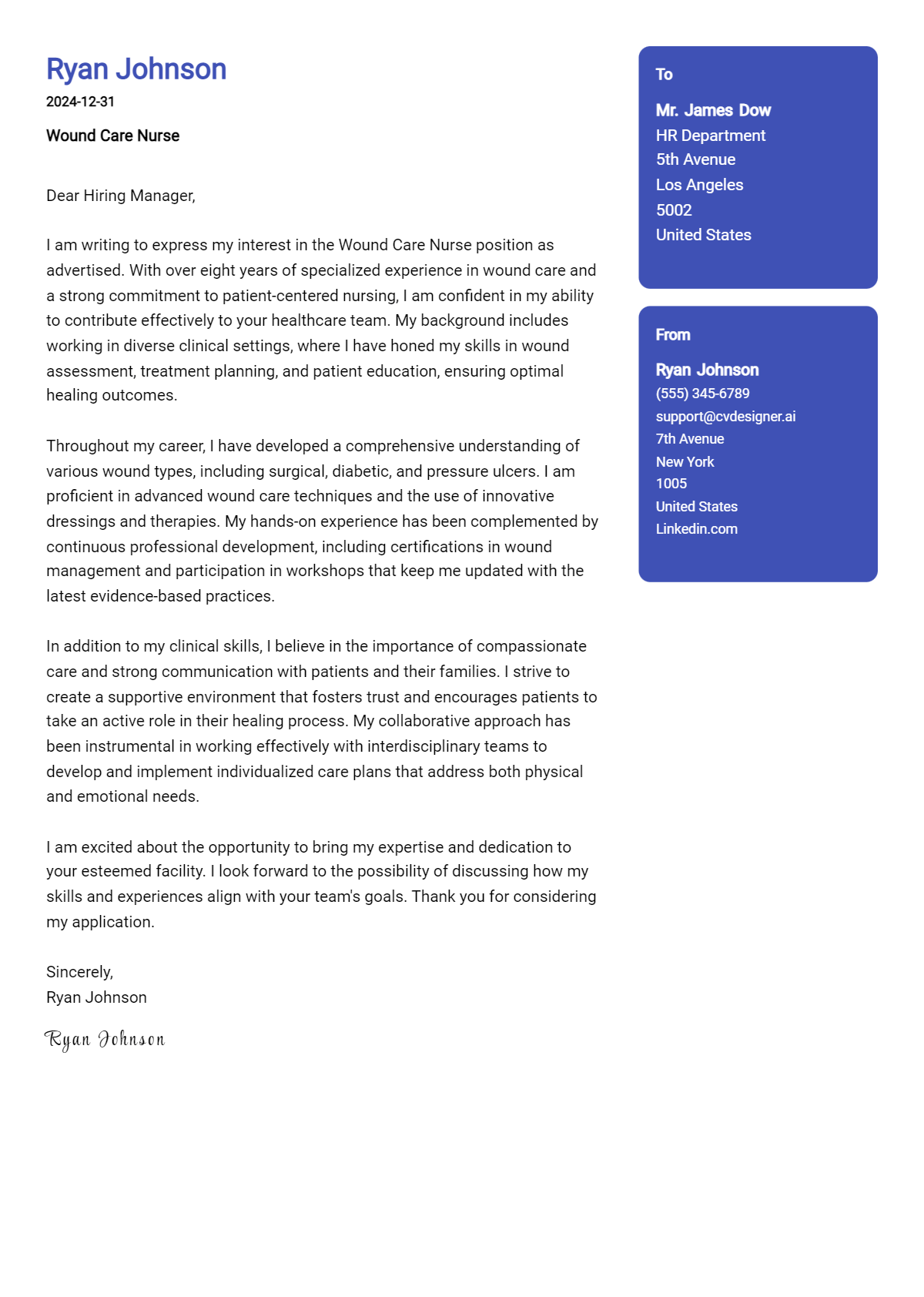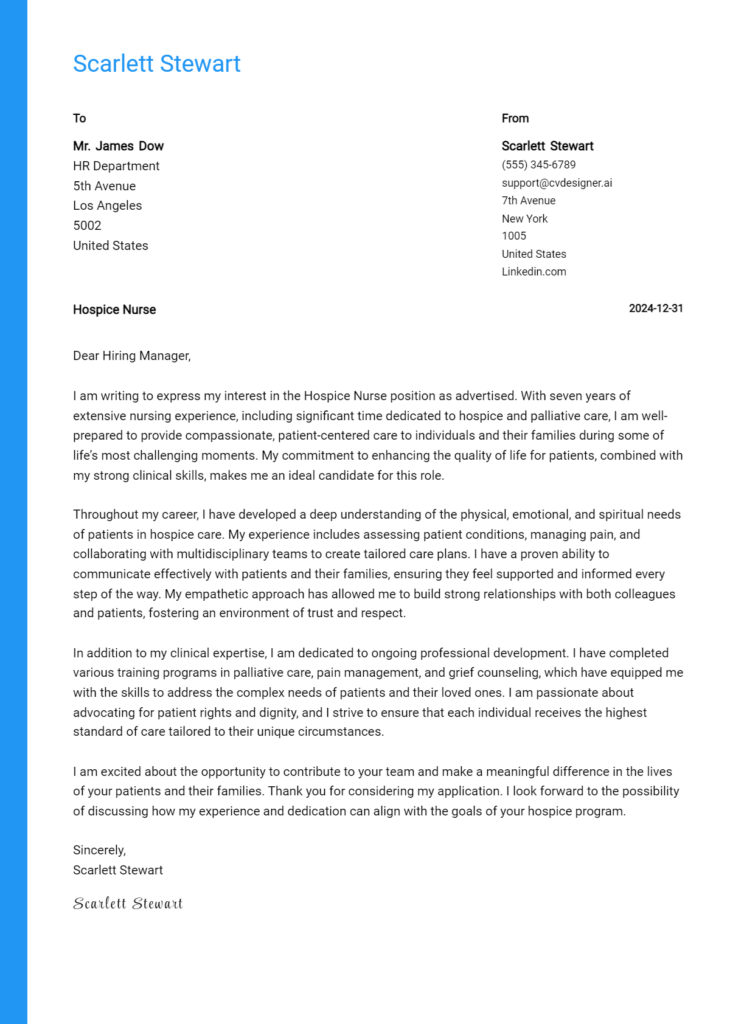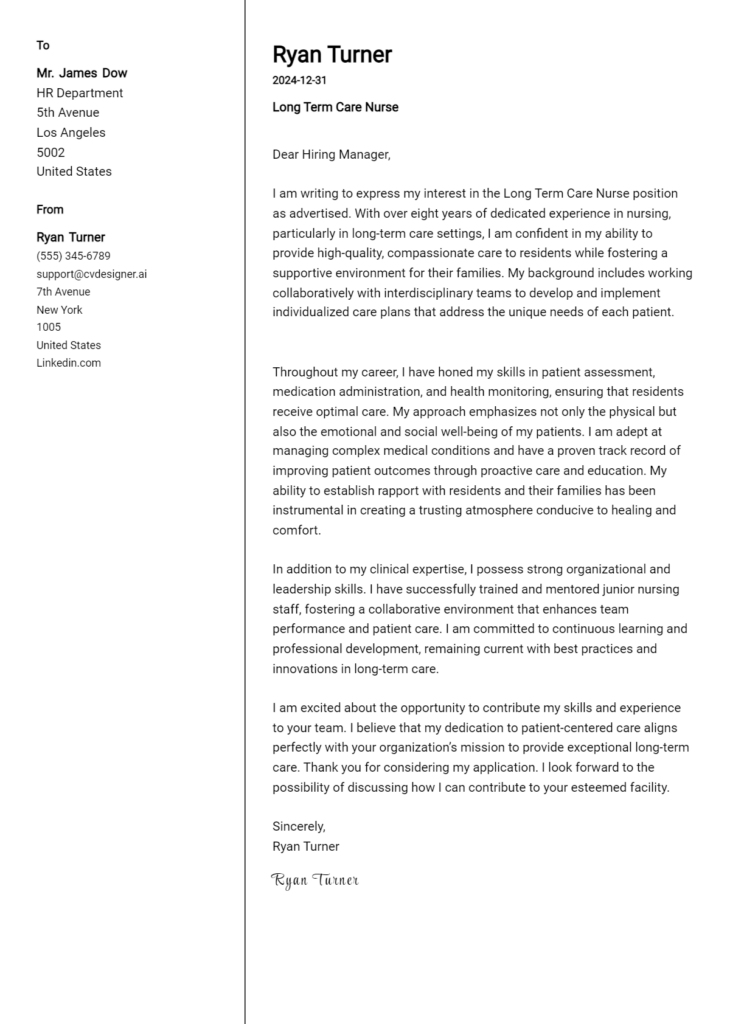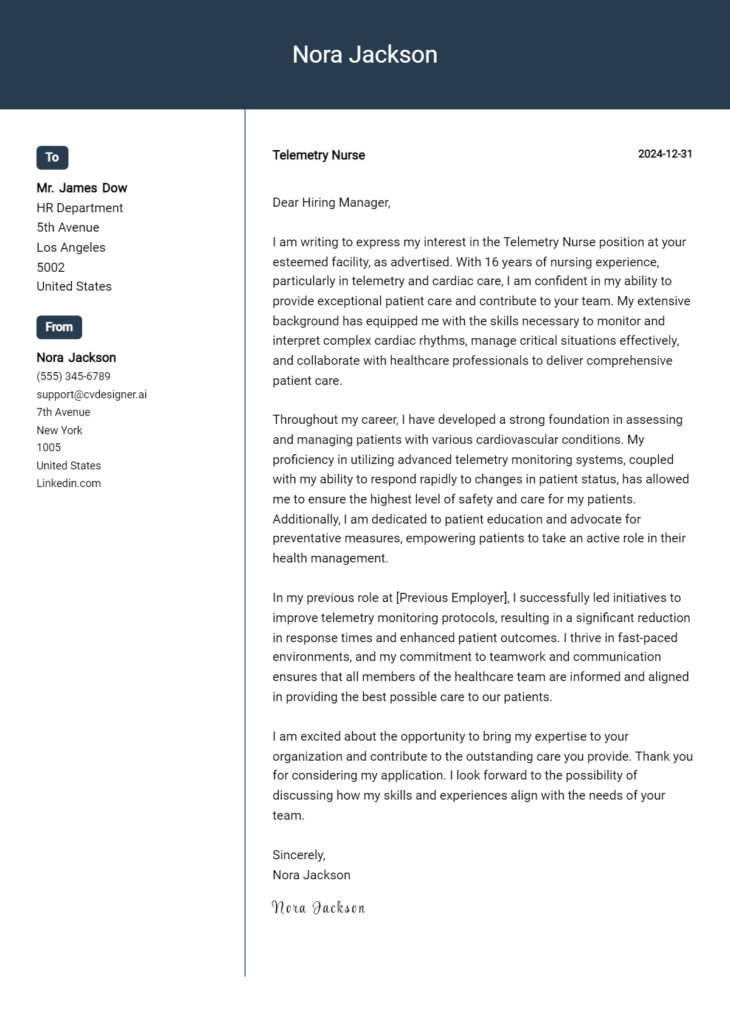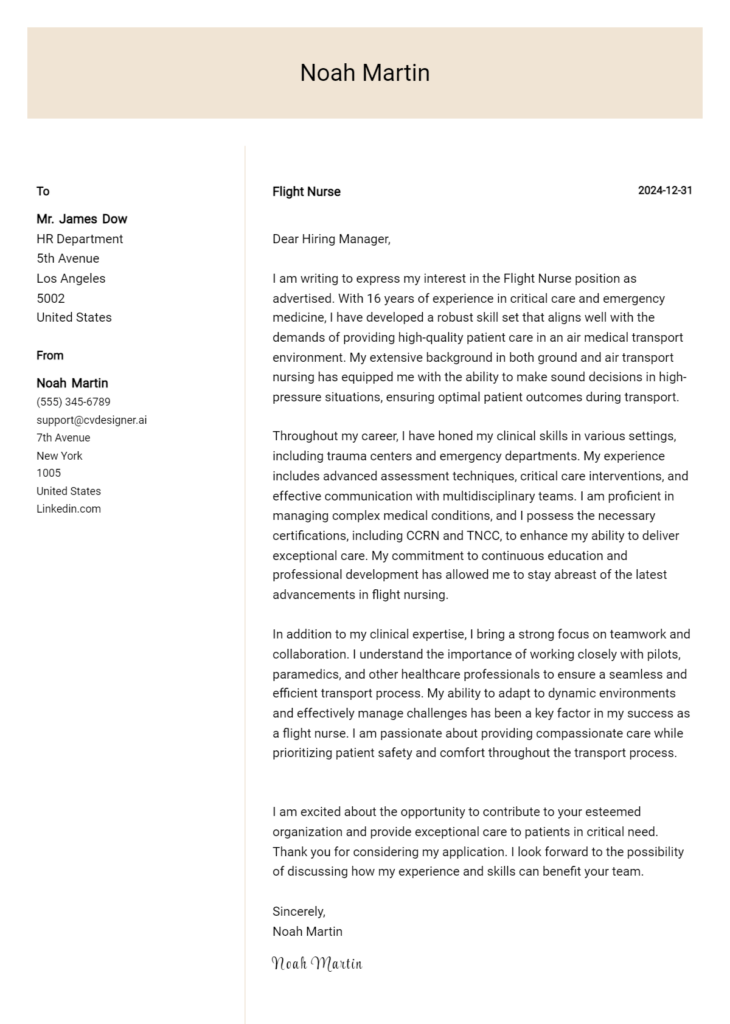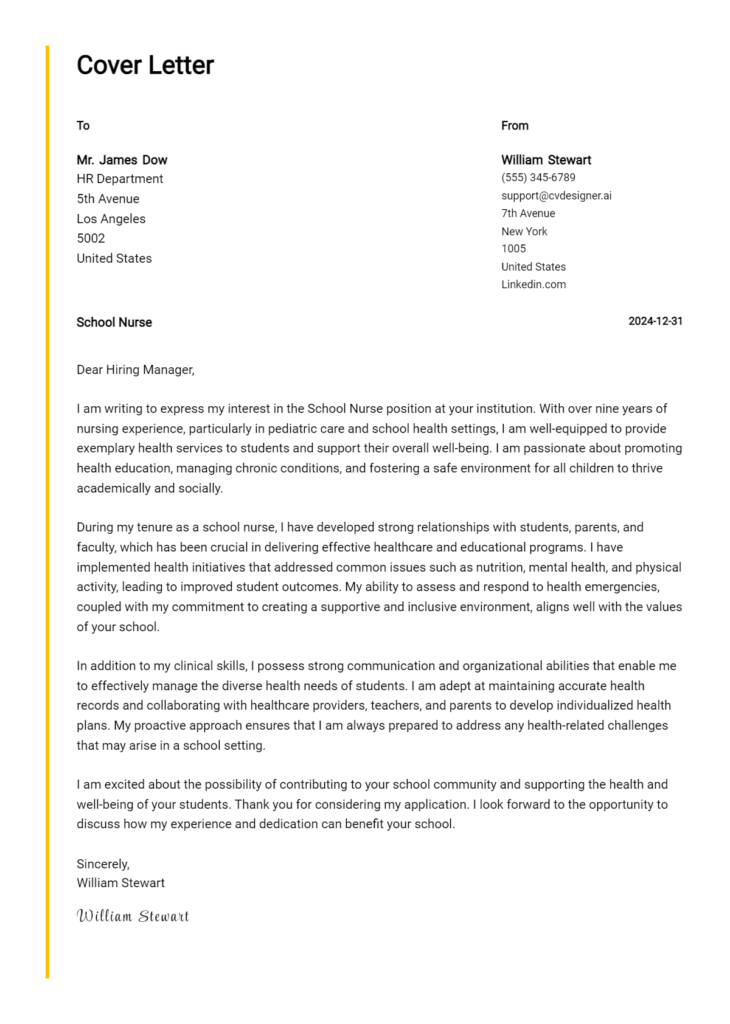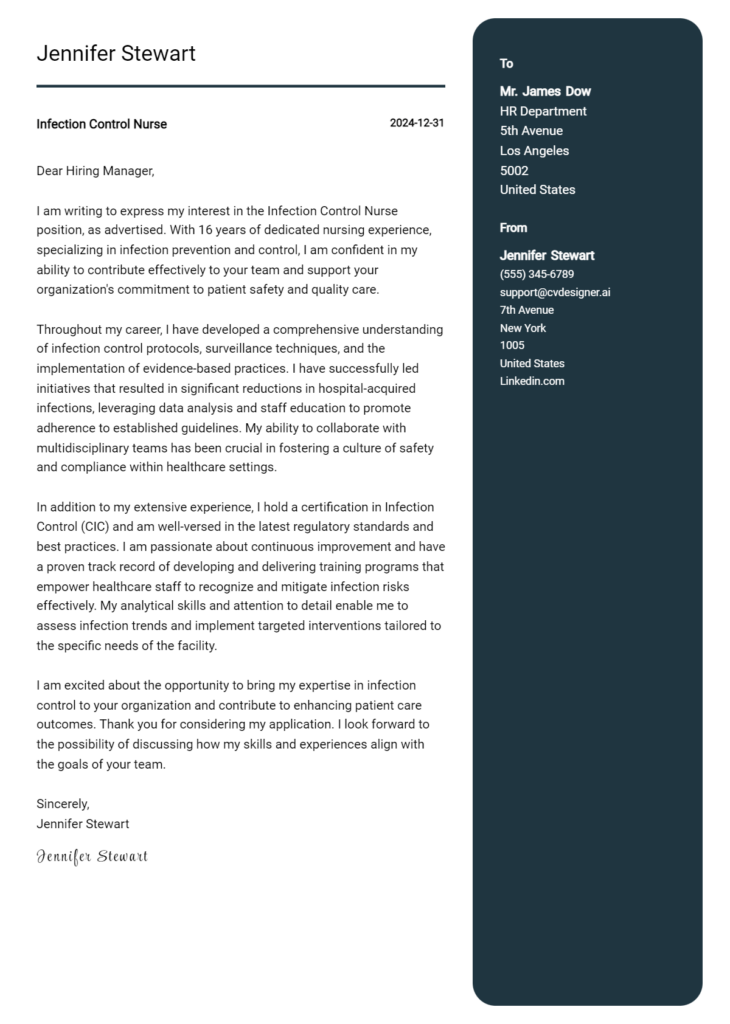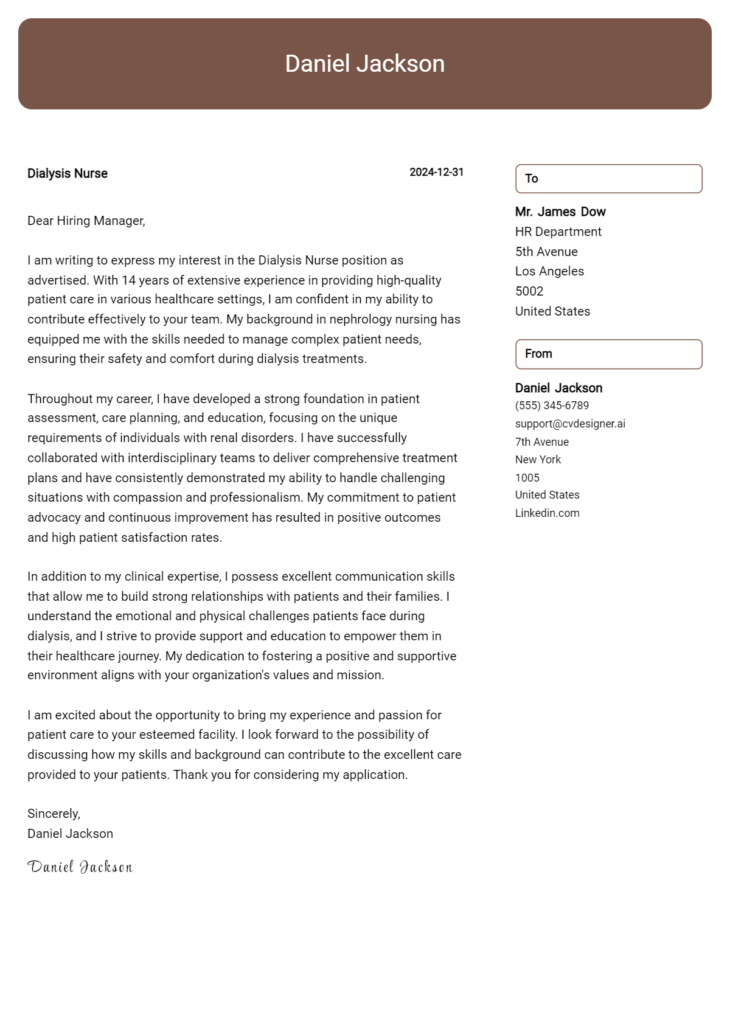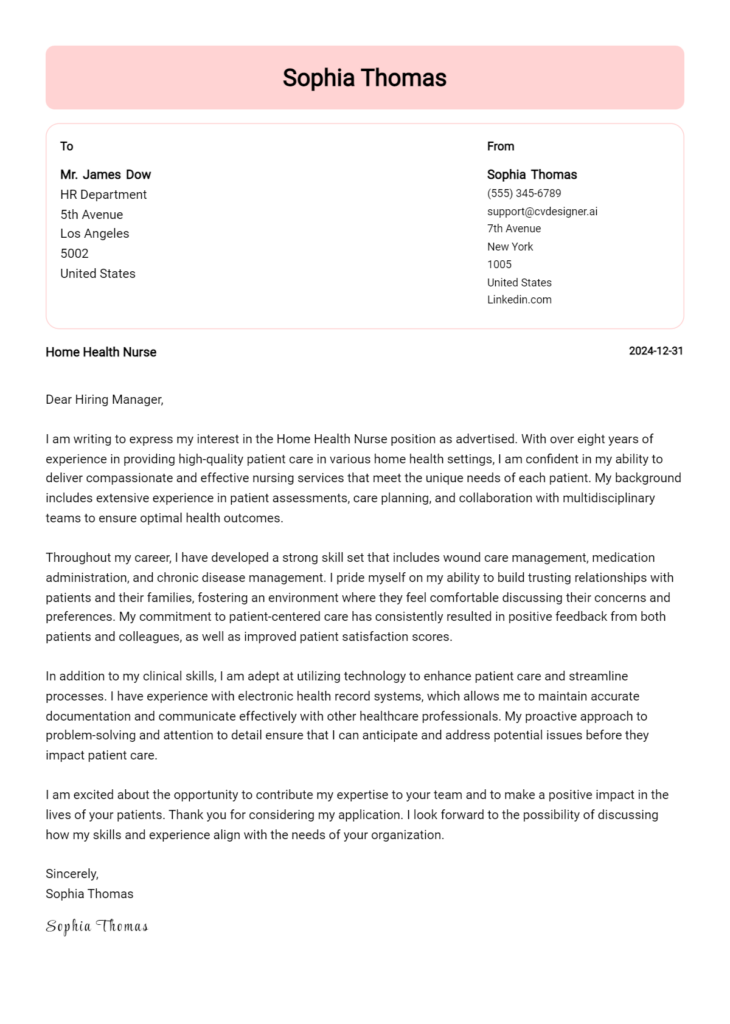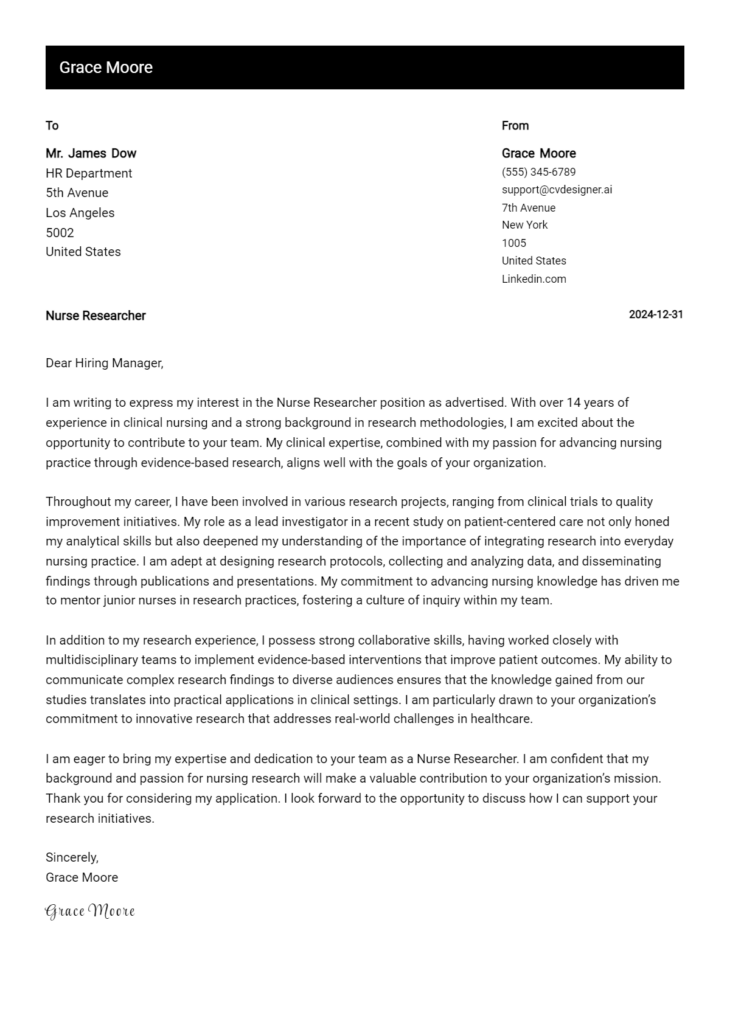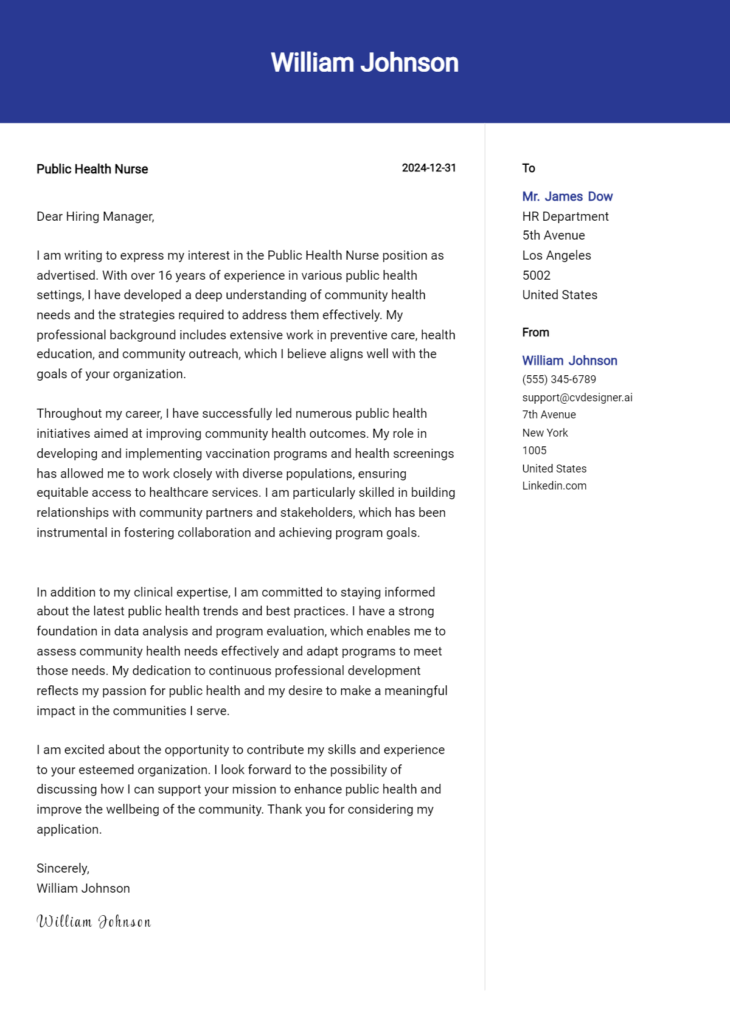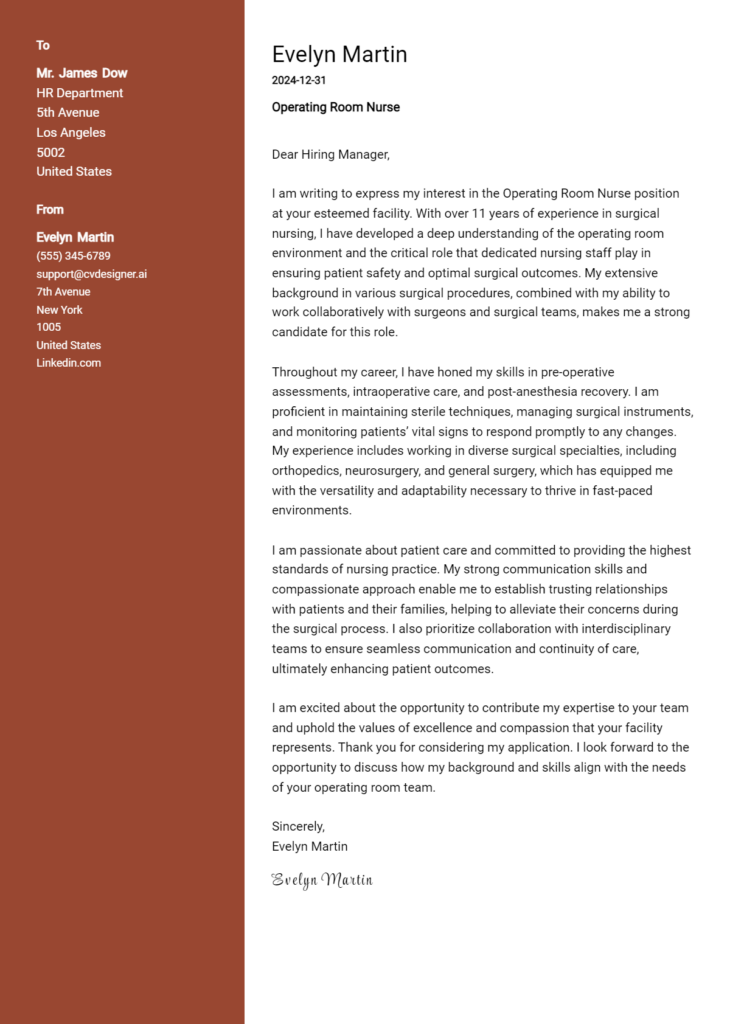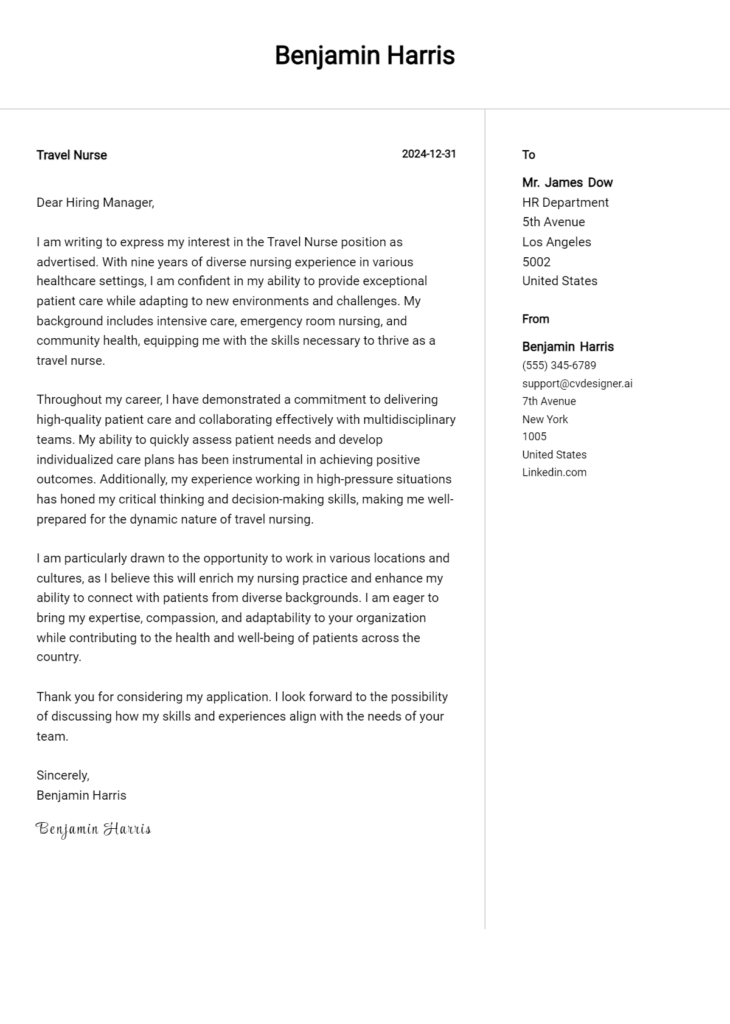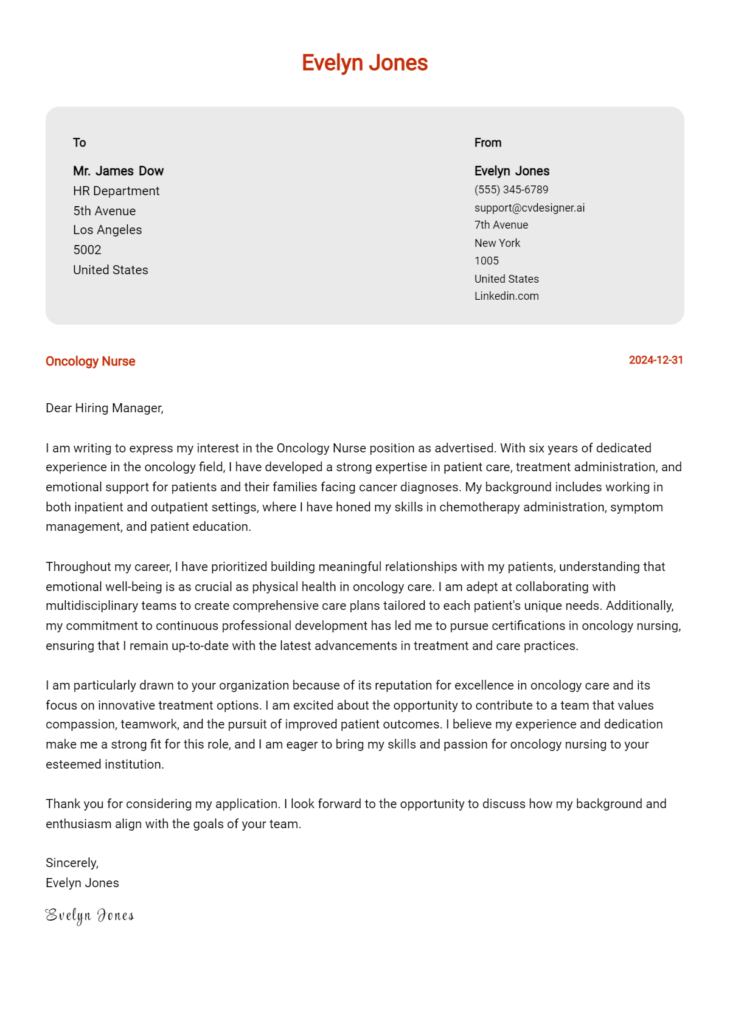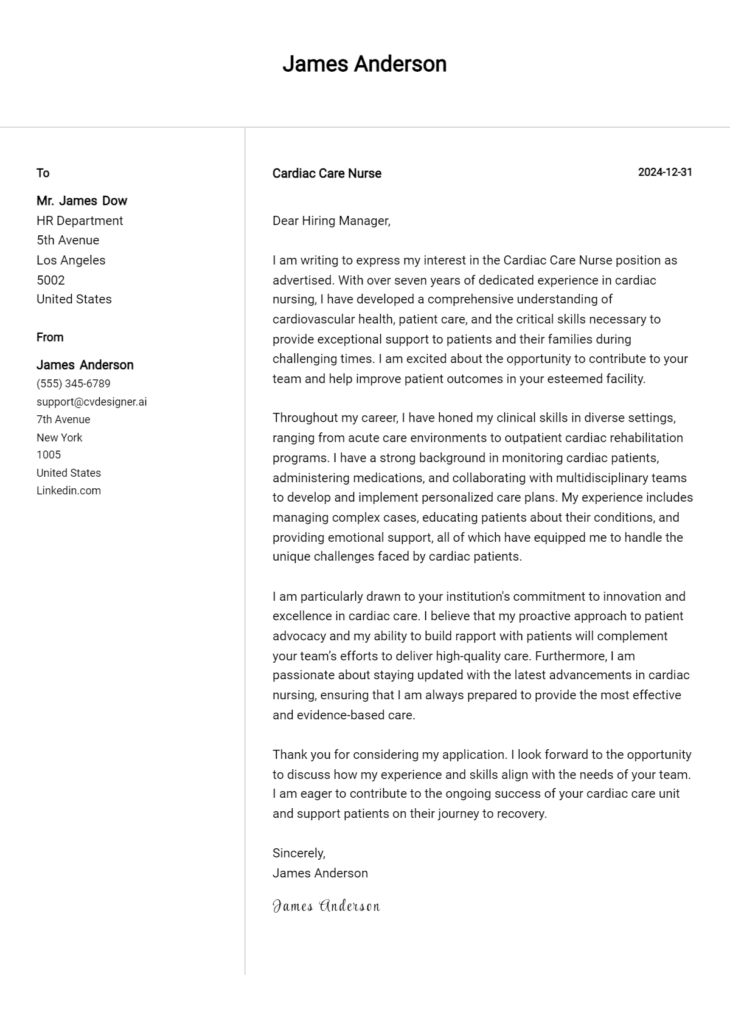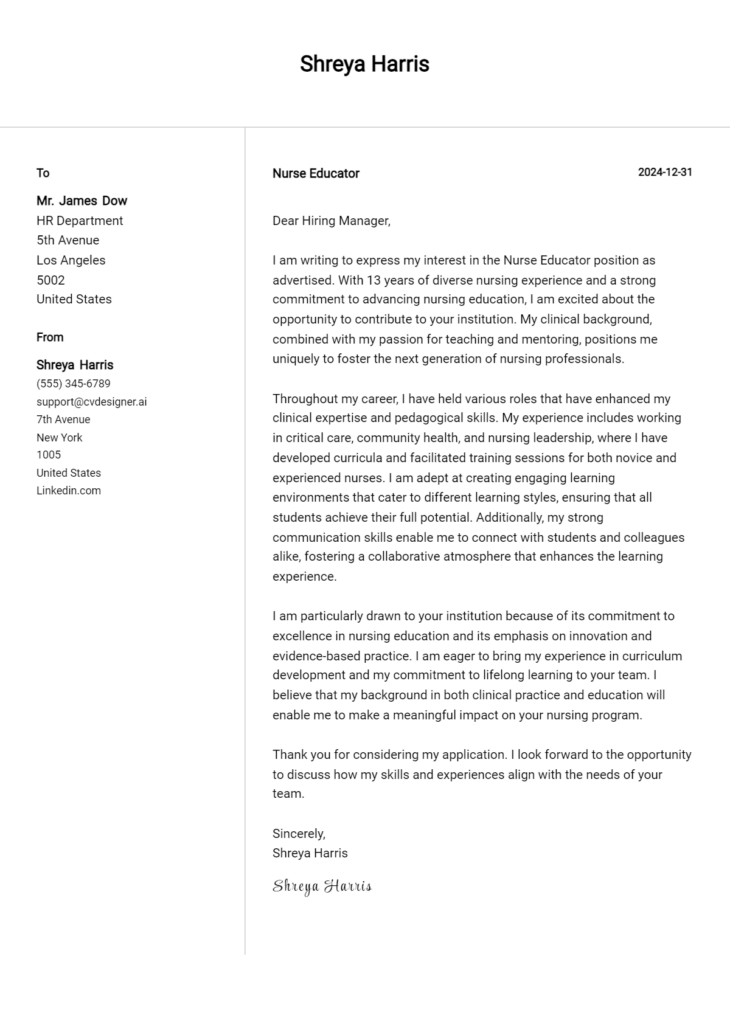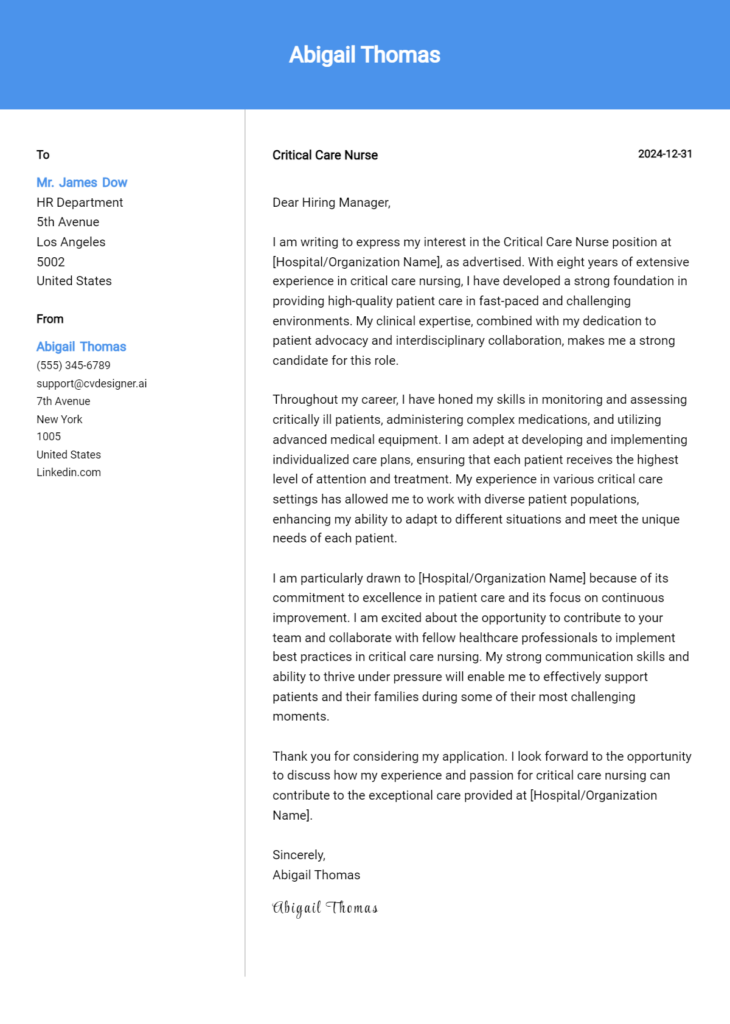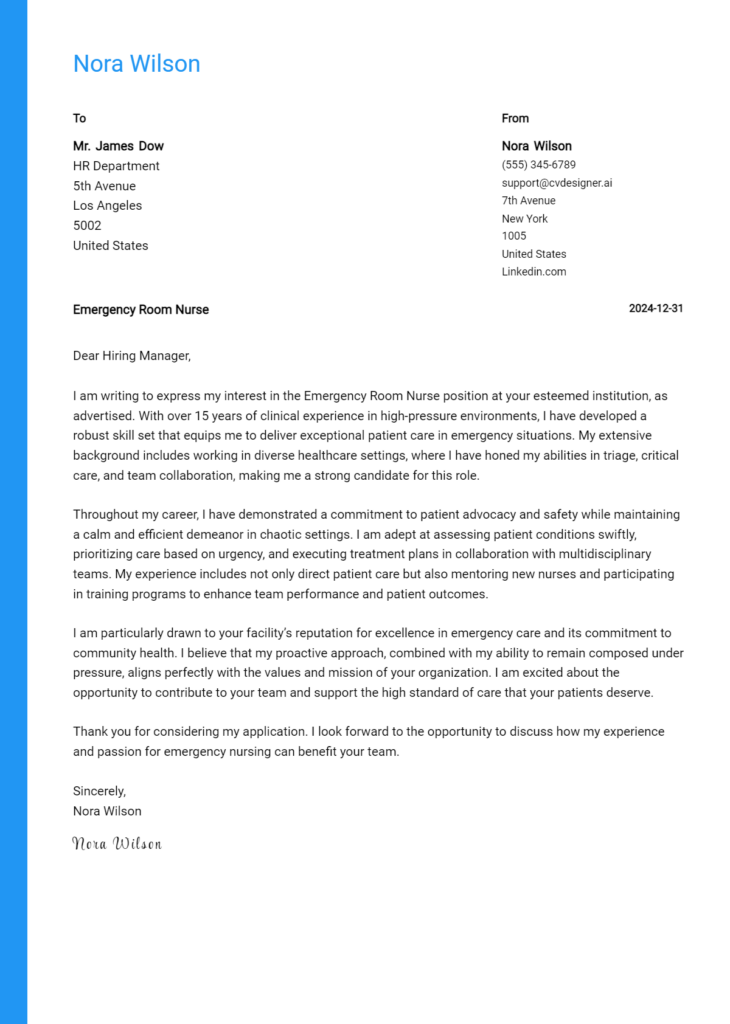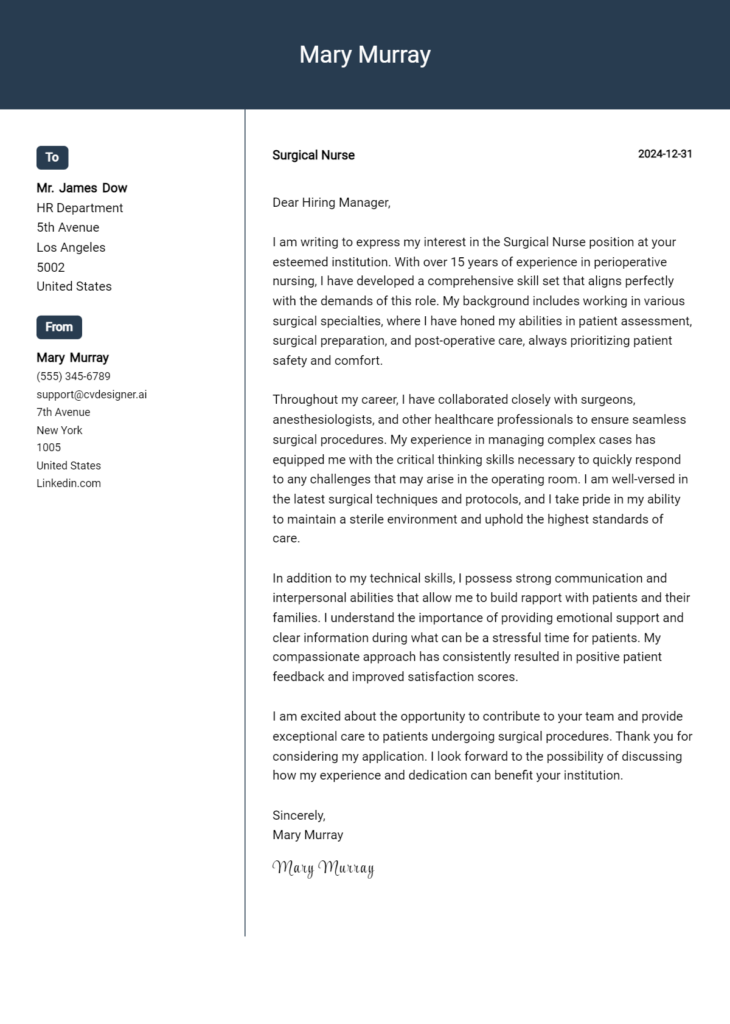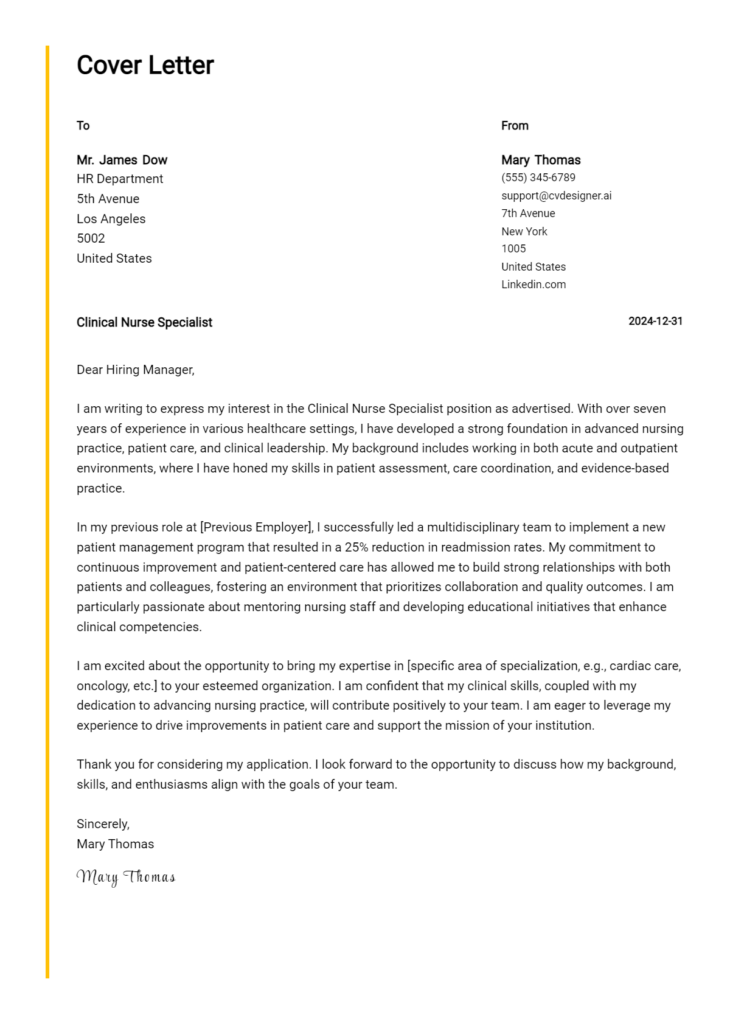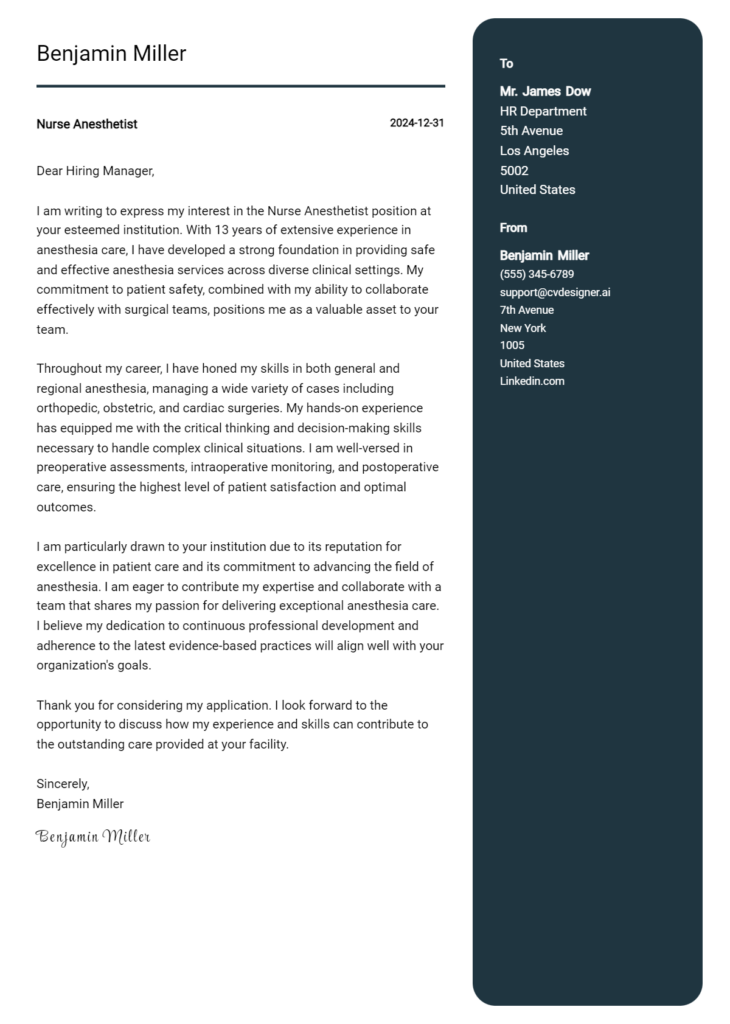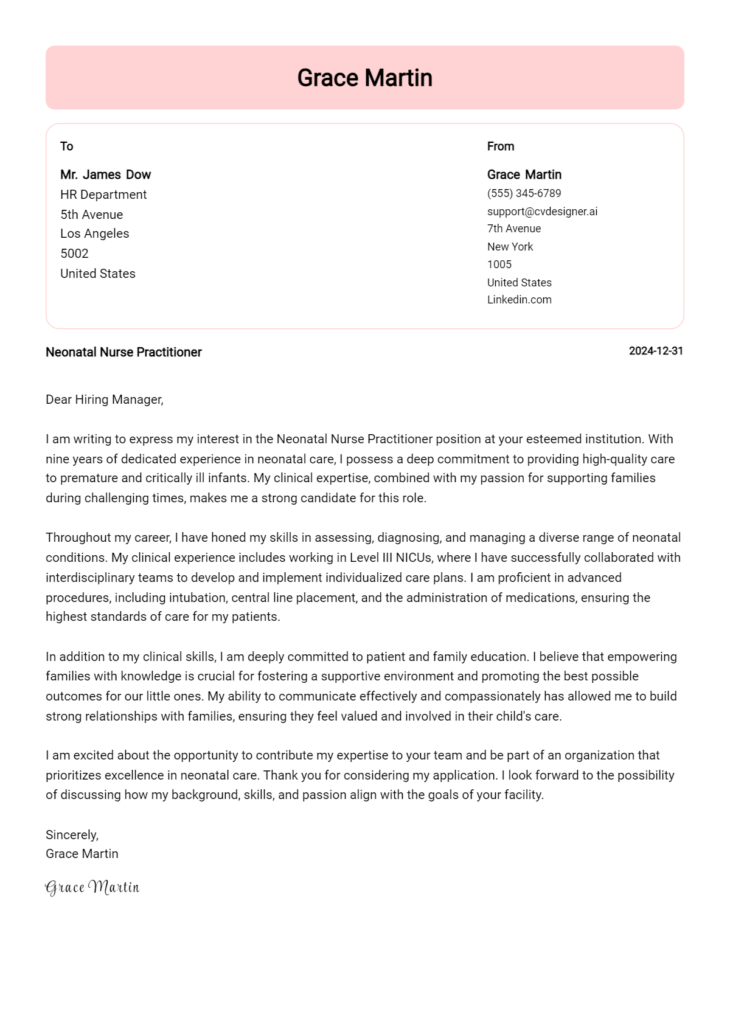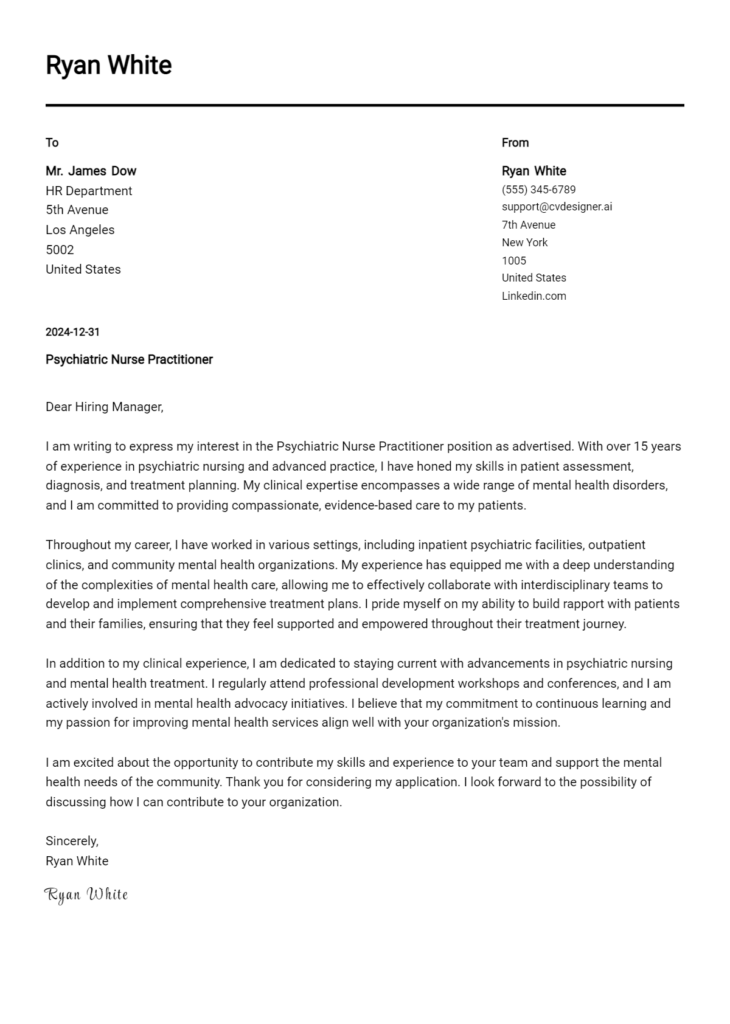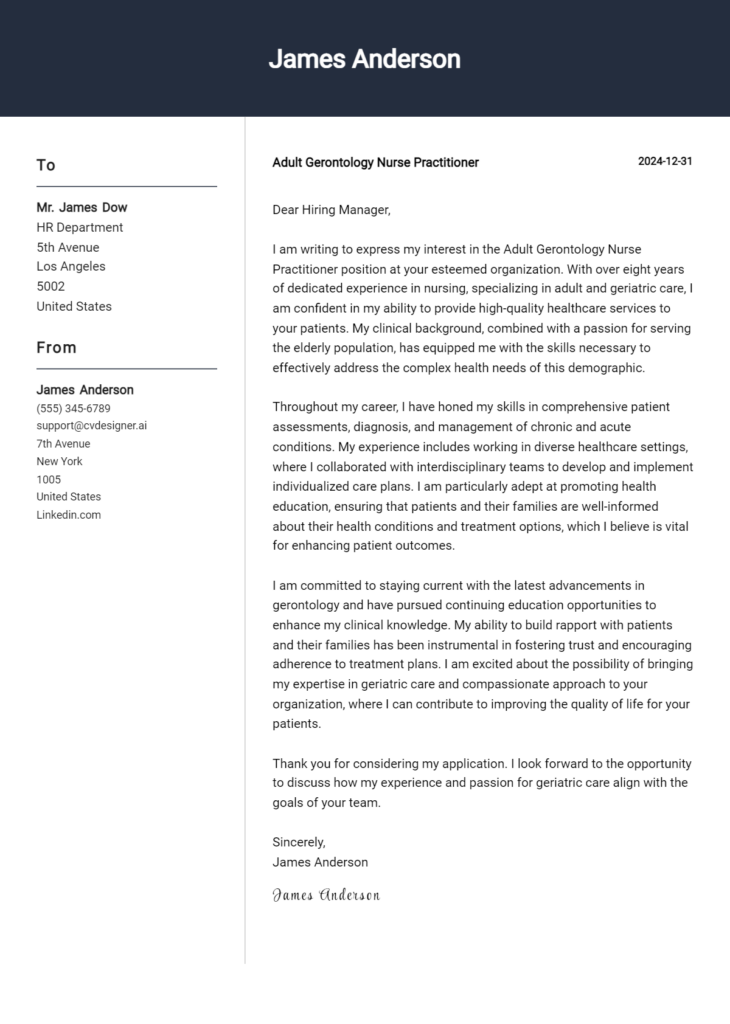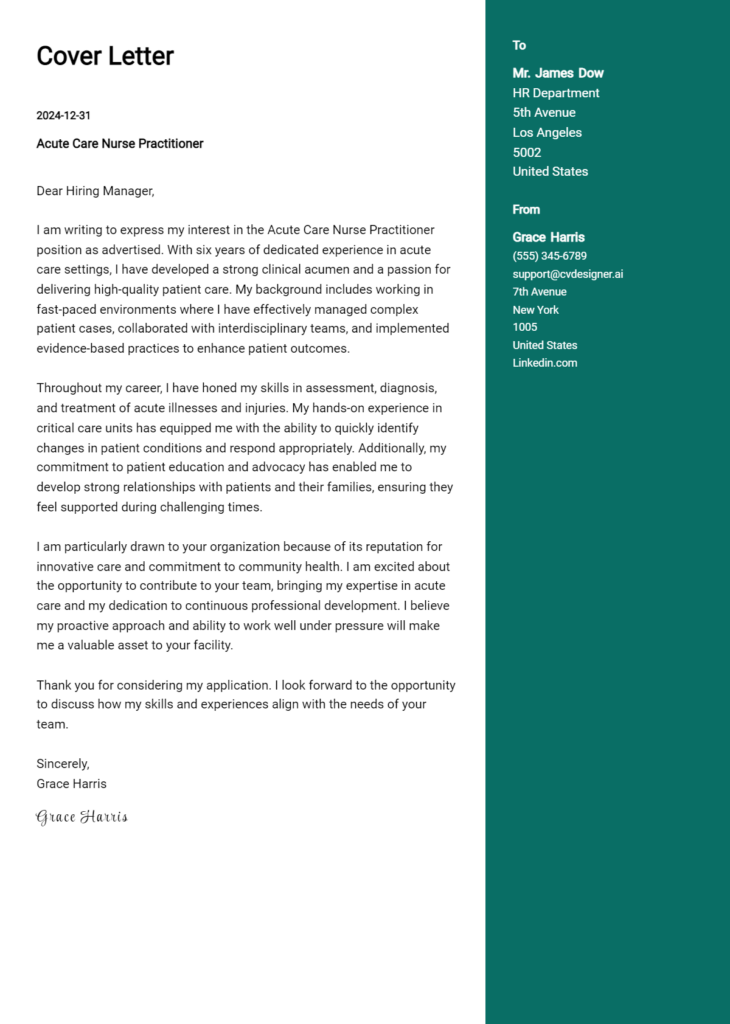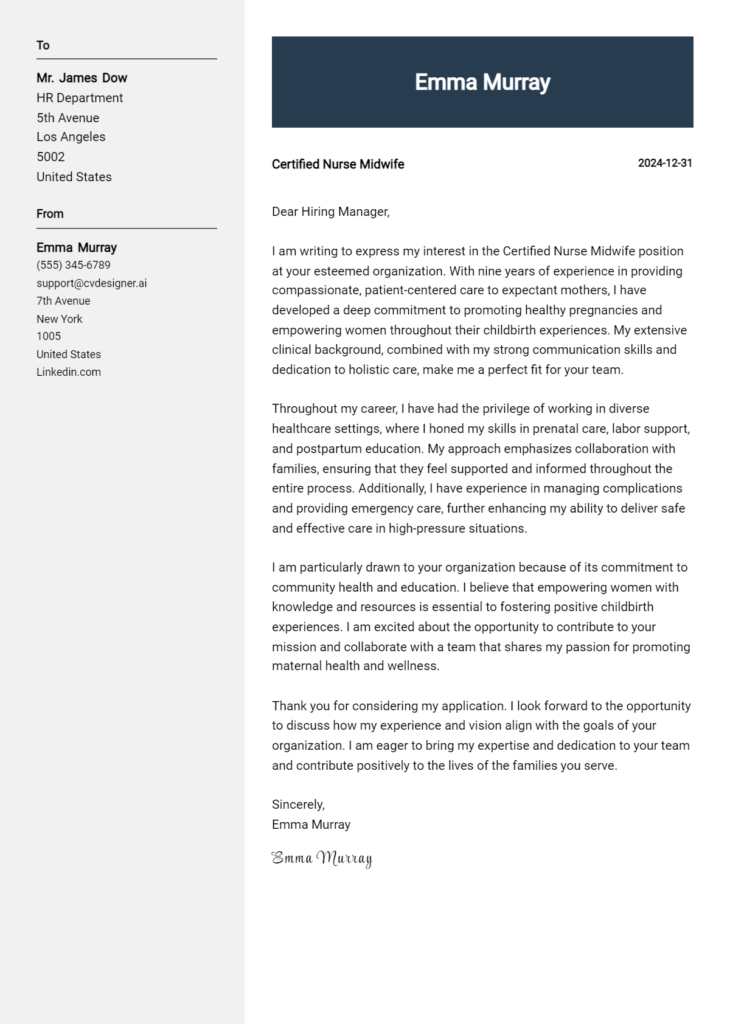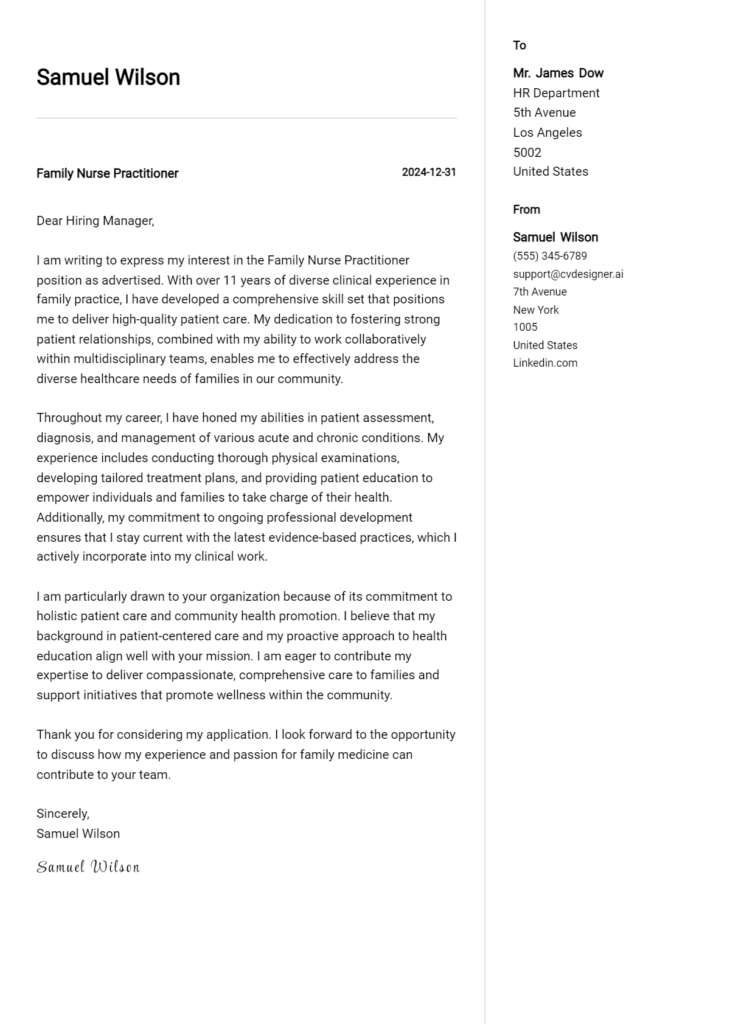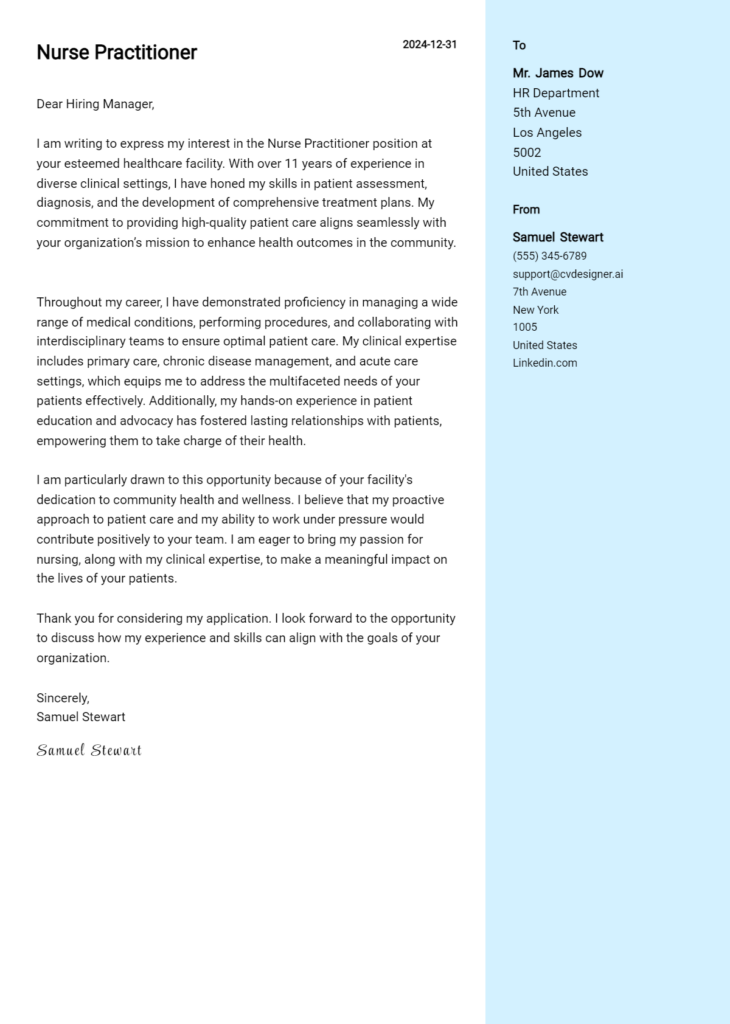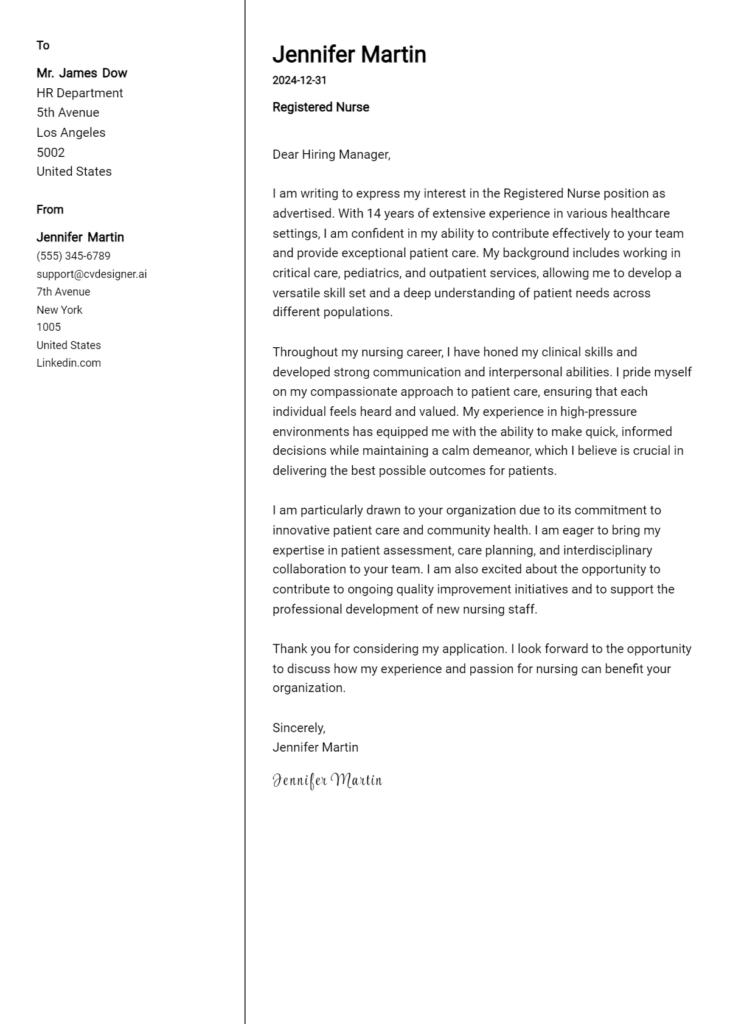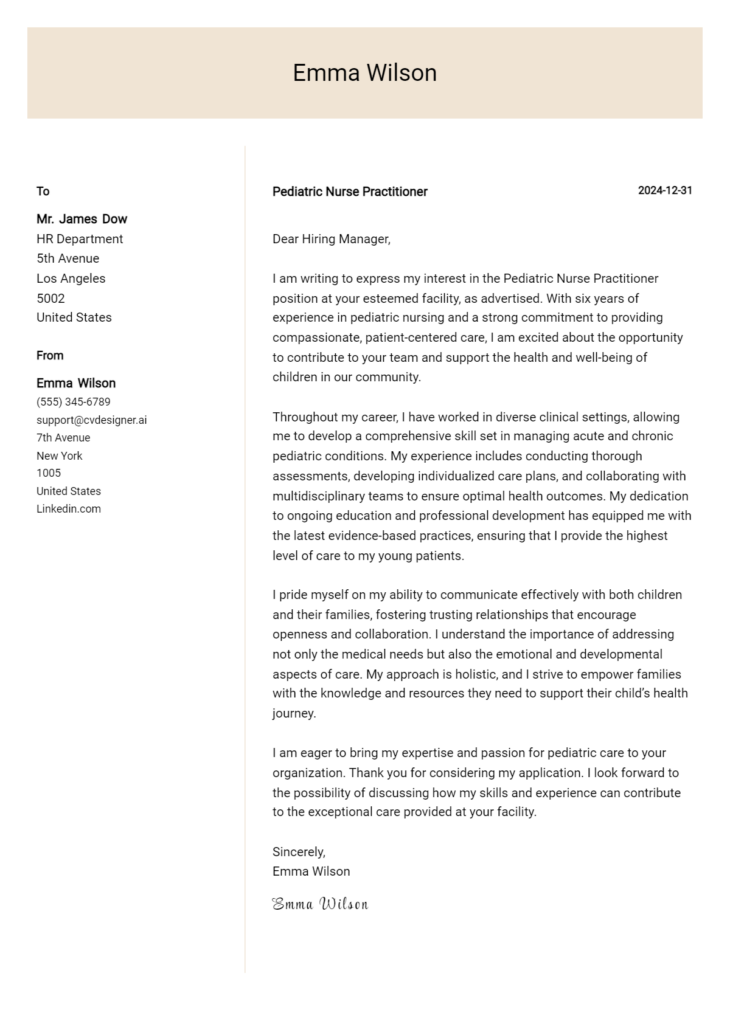Wound Care Nurse Cover Letter Examples
Explore additional Wound Care Nurse cover letter samples and guides and see what works for your level of experience or role.
How to Format a Wound Care Nurse Cover Letter?
Crafting an impactful cover letter is essential for a Wound Care Nurse, as it serves as a first impression to potential employers. The healthcare field demands a high level of professionalism and compassionate care, and your cover letter should reflect these qualities. Proper formatting not only demonstrates your attention to detail but also highlights your ability to communicate effectively, which is crucial when providing patient care and collaborating with healthcare teams.
In this guide, we'll explore how to structure your cover letter, offering insights and nursing-specific examples to help you create a compelling document.
We'll focus on the essential components of a professional cover letter, including:
- Cover Letter Header
- Cover Letter Greeting
- Cover Letter Introduction
- Cover Letter Body
- Cover Letter Closing
Each section plays a vital role in showcasing your qualifications and commitment to quality patient care. Let’s break down each part and explain how to make your Wound Care Nurse cover letter stand out.
Importance of the Cover Letter Header for a Wound Care Nurse
The cover letter header is a crucial element that sets the tone for the entire document. It provides essential contact information, ensuring the hiring manager can easily reach the applicant. A well-organized header not only reflects professionalism but also enhances clarity, allowing the reader to quickly identify the applicant and their intent. The header should include the applicant's name, phone number, email address, the date, and the recipient's details (name, title, organization, and address). A strong header presents a polished image, while a weak one can create confusion or leave a negative impression.
Strong Example
John Doe, RN, CWCN 123 Healing Way Care City, ST 12345 (123) 456-7890 john.doe@email.com October 1, 2023 Ms. Jane Smith Hiring Manager Healing Hands Hospital 456 Care Lane Care City, ST 12345
Weak Example
John D. 1234 St. (123) 456-7890 jdoe@email 10/01/2023 To Whom It May Concern
The Importance of a Strong Cover Letter Greeting for a Wound Care Nurse
The greeting of your cover letter is crucial as it sets the tone for the rest of your application. A well-crafted greeting not only demonstrates professionalism but also personalizes your communication by directly addressing the hiring manager. This initial connection can create a positive impression and engage the reader from the outset. To avoid sounding generic, take the time to research the recipient’s name and title, ensuring that your greeting reflects genuine interest in the position. A personalized approach can enhance your chances of standing out among other candidates.
Strong Greeting Example
Dear Ms. Johnson,
Weak Greeting Example
To Whom It May Concern,
Importance of a Well-Crafted Cover Letter Introduction for a Wound Care Nurse
A well-crafted cover letter introduction is crucial for a Wound Care Nurse as it serves as the first impression to the hiring manager. This opening paragraph should not only capture attention but also express genuine interest in the role while briefly highlighting key skills or achievements relevant to wound care. A strong introduction sets the tone for the rest of the letter and encourages the reader to continue, ultimately increasing the candidate's chances of landing an interview. Below are examples of strong and weak cover letter introductions for a Wound Care Nurse position.
Strong Example
Dear [Hiring Manager's Name], As a dedicated and highly skilled Wound Care Nurse with over five years of experience in managing complex wound care cases, I am excited to apply for the position at [Company Name]. My passion for patient-centered care, combined with my expertise in advanced wound management techniques, has consistently resulted in improved healing outcomes and enhanced patient satisfaction. I am eager to bring my skills to your esteemed team, where I can contribute to your commitment to excellence in wound care.
Weak Example
To whom it may concern, I am writing to apply for the Wound Care Nurse position. I have some experience in nursing, and I think I could do this job. I have worked at a few hospitals and have treated patients with wounds. I hope you will consider my application.
Purpose of the Cover Letter Body for a Wound Care Nurse
The body of a cover letter for a Wound Care Nurse serves as a critical opportunity for the candidate to articulate their unique qualifications, experiences, and contributions to the field of wound care. This section should highlight specific projects, certifications, and patient outcomes that demonstrate the candidate's expertise in managing complex wounds and collaborating with multidisciplinary teams. By providing tangible examples of past successes, such as implementing evidence-based practices that improved patient healing times or leading a training program for staff on advanced wound care techniques, the candidate can effectively convey their value to the prospective employer. A well-crafted cover letter body not only showcases the nurse's clinical skills but also reflects their passion for patient care and commitment to enhancing wound management practices within the organization.
Strong Example
Dear Hiring Manager, I am excited to apply for the Wound Care Nurse position at ABC Hospital. With over five years of experience in wound management and a certification in Wound Care Nursing, I have successfully treated patients with various complex wounds, including diabetic ulcers and post-surgical infections. One of my notable projects involved developing a wound care protocol that reduced healing times by 30% across our patient population. Additionally, I led training sessions for nursing staff on advanced dressing techniques, which not only improved patient outcomes but also fostered a collaborative learning environment. My commitment to providing compassionate care and my proactive approach to problem-solving make me an ideal candidate for this role. I look forward to the opportunity to contribute my skills to your esteemed team. Sincerely, [Your Name]
Weak Example
Dear Hiring Manager, I want to apply for the Wound Care Nurse job. I have worked in nursing for a while and I think I can do a good job. In my previous job, I saw some patients with wounds, and I helped them. I believe I can help your team too. I am a quick learner and I am willing to learn more. Thank you for considering my application. Best, [Your Name]
Importance of the Cover Letter Closing for a Wound Care Nurse
The closing paragraph of a cover letter is crucial as it serves to summarize your qualifications, reiterate your enthusiasm for the role, and encourage the hiring manager to take the next steps, such as reviewing your resume or scheduling an interview. A strong closing can leave a lasting impression, showcasing your professionalism and eagerness to contribute to the team, while a weak closing may undermine your overall message and fail to inspire action.
Strong Example
Thank you for considering my application for the Wound Care Nurse position. With my extensive experience in patient care, specialized training in wound management, and a passion for improving patient outcomes, I am excited about the opportunity to contribute to your esteemed hospital. I look forward to the possibility of discussing how my skills align with your team’s needs. Please feel free to contact me to schedule an interview at your convenience. I have attached my resume for your review.
Weak Example
Thanks for reading my letter. I hope you think about my application. I guess you can look at my resume if you want. Let me know if you want to talk or something.
Crafting an effective cover letter is essential for aspiring Wound Care Nurses to stand out in a competitive job market. This document not only introduces you to potential employers but also allows you to showcase your unique qualifications and passion for the field. Highlighting your technical skills, problem-solving abilities, knowledge of the Software Development Life Cycle (SDLC), teamwork, and commitment to continuous learning will significantly enhance your application. The following tips will guide you in creating a compelling cover letter that captures the attention of hiring managers.
Tips for Writing an Effective Cover Letter for Wound Care Nurse
Emphasize Technical Skills
As a Wound Care Nurse, proficiency in wound assessment and treatment techniques is crucial. Highlight specific skills such as wound debridement, dressing selection, and infection control practices. Use concrete examples from your experience to demonstrate your expertise, showing how these skills have positively impacted patient outcomes.Showcase Problem-Solving Abilities
Wound care often involves complex cases requiring critical thinking and innovative solutions. Illustrate your problem-solving capabilities by sharing instances where you successfully addressed challenging wound care scenarios. This could involve collaborating with interdisciplinary teams or adapting treatment plans based on patient needs.Include Knowledge of SDLC
While this may seem less relevant, understanding the Software Development Life Cycle can be beneficial, particularly if you have experience with electronic health records (EHR) or wound care management software. Mention any relevant experience you have with implementing or using these technologies, as they can enhance care delivery and documentation.Highlight Teamwork and Collaboration
Wound care often involves working closely with other healthcare professionals, such as physicians, physical therapists, and nutritionists. Discuss your ability to collaborate effectively within a multidisciplinary team. Provide examples of successful team projects or initiatives where your contribution made a difference in patient care.Demonstrate a Passion for Continuous Learning
The field of wound care is constantly evolving, with new techniques and research emerging regularly. Convey your enthusiasm for professional development by mentioning any additional certifications, workshops, or conferences you have attended. This commitment to continuous learning not only enhances your skills but also shows employers that you are dedicated to providing the best care possible.
By following these tips, you can create a powerful cover letter that highlights your qualifications and sets you apart as a candidate for Wound Care Nurse positions. For additional resources, consider exploring our cover letter templates or utilizing a cover letter builder to streamline the writing process.
Common Mistakes to Avoid in a Wound Care Nurse Cover Letter
Crafting a compelling cover letter is essential for standing out in the competitive field of wound care nursing. Avoiding common mistakes can significantly enhance your chances of landing an interview. Here are some pitfalls to watch out for:
Generic Language: Using a one-size-fits-all approach makes your letter forgettable. Personalize your cover letter by addressing the specific needs of the employer and mentioning relevant experiences that align with their requirements.
Neglecting Formatting: Poor formatting can make your cover letter difficult to read. Follow a clear and professional cover letter format to ensure your document is visually appealing and easy to navigate.
Overly Lengthy Content: A cover letter should be concise. Aim for a one-page letter that highlights your most relevant qualifications without unnecessary details.
Focusing on Duties Instead of Achievements: Rather than listing job responsibilities, showcase your achievements in previous roles. Use specific metrics or outcomes to illustrate your impact in a wound care setting.
Ignoring the Employer's Needs: Tailor your cover letter to reflect how your skills and experiences meet the specific needs of the employer. Research the organization and incorporate their values or goals into your letter.
Typos and Grammatical Errors: Proofreading is crucial. Mistakes can create a negative impression and suggest a lack of attention to detail. Always review your letter multiple times or seek a second opinion.
Failing to Include a Call to Action: Conclude your letter with a strong call to action, expressing your enthusiasm for an interview and your willingness to discuss your qualifications further.
By avoiding these common mistakes, you can create a strong cover letter that effectively showcases your qualifications as a Wound Care Nurse. For inspiration, check out various cover letter examples to see how others have succeeded in crafting their letters.
Cover Letter FAQs for Wound Care Nurse
What should I include in my cover letter for a Wound Care Nurse position?
When crafting your cover letter for a Wound Care Nurse position, it's essential to highlight your relevant qualifications and experiences. Begin by introducing yourself and expressing your enthusiasm for the role. Clearly outline your nursing credentials, focusing on your specialization in wound care. Include specific examples of your experience with different types of wounds, treatment techniques, and any certifications, such as Wound, Ostomy, and Continence Nursing Certification (WOCN). Additionally, mention your ability to collaborate with multidisciplinary teams and educate patients and their families about wound management. Tailoring your cover letter to reflect the specific job description can make your application stand out.
How can I demonstrate my skills in wound care through my cover letter?
To effectively demonstrate your skills in wound care, provide concrete examples of your experiences and achievements in the field. Highlight your proficiency in assessing and treating various wound types, including surgical, diabetic, and pressure ulcers. Discuss any advanced techniques you have mastered, such as negative pressure wound therapy or bioengineered skin substitutes. If applicable, mention your role in developing wound care protocols or participating in quality improvement initiatives. Incorporating metrics or outcomes—like a percentage improvement in healing rates—can showcase your contributions and expertise. Remember to align your skills with the specific needs of the employer, emphasizing how you can positively impact patient outcomes.
Should I mention my nursing education in my cover letter?
Yes, mentioning your nursing education in your cover letter is important, especially if you have specialized training related to wound care. Start by stating your nursing degree, the institution you attended, and any relevant coursework or clinical rotations focused on wound management. If you hold advanced degrees or certifications related to wound care, such as a Certified Wound Care Nurse (CWCN) designation, be sure to highlight these credentials prominently. Additionally, discussing any continuing education or professional development courses you have completed can demonstrate your commitment to staying current in the field. This reinforces your qualifications and shows potential employers that you are dedicated to providing high-quality patient care.
How do I tailor my cover letter to a specific employer in wound care?
To tailor your cover letter to a specific employer in wound care, start by researching the organization and understanding its mission, values, and any recent initiatives focused on wound management. Use this information to align your experiences and skills with their goals. For instance, if the employer emphasizes patient-centered care, highlight your approach to patient education and your success in improving patient outcomes. You can also refer to specific programs or technologies the employer uses in their wound care practice, demonstrating that you are informed and genuinely interested in their work. Personalizing your cover letter not only shows your enthusiasm for the position but also positions you as a strong candidate who understands the employer's needs.
Build your Cover Letter in minutes
Use an AI-powered cover letter builder and have your letter done in 5 minutes. Just select your template and our software will guide you through the process.

